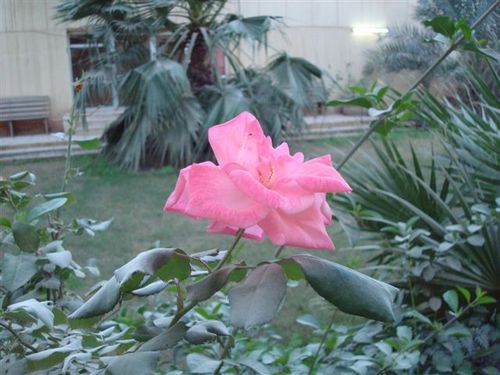Every week, I download pictures taken on the camera I almost always carry with me, look at what I’ve seen and then try to come up with words to explain my experiences. It is like a photo journal. This week, the phrase “the good, the bad, and the ugly” comes to mind.
I have a shot of a beautiful sunset and serveral pictures of the few flowers on base: mums thriving outside the entrance to the main laundry, delicate but fiercely resilient desert flowers blooming along my walk to the office, and a rose in our Garden of Eden courtyard at the office.
The flowers are a testimony to someone’s desire to create and nourish beauty in an otherwise stark landscape. Seeing a bourgeoning patch of mums or a single pink rose allows us pause and admire, and perhaps, escape our otherwise difficult surroundings for a few moments.
But planting something in the desert is an act of hopefulness, too. When someone plants, they have done it with the expectation that it will bloom at some later date and someone will be there to appreciate the colorful petals or the shade that has grown. A pessimistic person doesn’t plant seeds, especially in the desert.
This week, I also have a picture of dusk that is as disconcerting as the flowers are reassuring. Three green stars painted on a cement pillar — remnants of Hussein’s Air Force –, barbed wires, and debris fill the foreground as a dusty sun lowers itself to the horizon. Willa Cather set some of the most poignant scenes in her novels during twilight, the short window between day and night, a time of transition offering opportunity and vulnerability. We are at such a crossroads here.
“The good, the bad, and the ugly” also reminds me of our work delivering emergency communication messages. Many people think that with the Internet and cell phones, it is easy for service members to stay in touch with their families. This is simply not the case. Cell phones are not available in most locations due to security concerns and access to computers and land phones requires waiting in line. These types of messages can’t wait for the weekly call or email home.
Most of the messages are sad — the death of a beloved grandparent, the hospitalization of a servicemember’s toddler, a fire at a service member’s home. Some are worse: the breakdown in child care or the alleged abuse of a servicemember’s children, or the diagnosis of severe depression or chemical dependency of a spouse at home. The only happy messages are the birth notifications.
The other happiness or “good” on our deployment comes from our relationships with each other and the servicemen and women. We have become close even though four of us are in Baghdad on Camp Liberty, four are about 50 miles north in Balad on Camp Anaconda, and four of us are 50 miles farther north near Tikrit on COB Speicher.
Mike, a team member destined for Balad on Camp Anaconda saved me a seat when they were scarce before a formation at Ft. Benning, even when one of the team leaders wanted the seat. Mike justified his choice by saying that I smelled better than others mingling around looking for a seat– they were all male. This might seem odd and too personal under normal circumstances, but our staff bonded quickly while we were being briefed in DC and processed at Ft. Benning. Nicole, also now at Camp Liberty, calls me and the other women, “Sis.” Here at COB Speicher, Debby with her Southern kindness calls me “Miss Ginny.” And we have picked up each others’ phrases and mottos. Brittany, the recent college graduate, has us all saying, “Seriously!” in a long drawn out and dramatic manner. Jay told me in jest while we were in DC that he has trouble hearing unless he is wearing his glasses. So when our phones are acting up, and he can’t make out what I am saying, I shout into the crackling line, “Jay, for Pete’s sake, put on your glasses!” It occurs to me, with all of these gestures, we are trying to temporarily fill a portion of the void created by being away from our families and friends at home.
So with the few flowers, the generous friendship among colleagues, and each glowing sunset that graces this place, we are fortified to do the best we can delivering emergency messages one day at a time.
